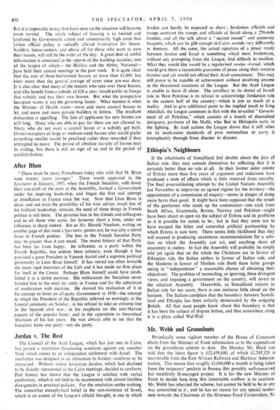After Blum
"There must be many Frenchmen today who wish that M. Blum were twenty years younger." These words appeared in the Spectator in January, 1947, when the French Socialists, with fewer than one-sixth of the seats in the Assembly, formed a Government under his inspiring leadership, and began the first real attempt at disinflation in France since the war. Now that Leon Blum is dead, and not even the possibility of his wise advice, much less of his brilliant leadership, remains, the need of these things in French politics is still there. The personal loss to his friends and colleagues_ and to all those who came, for however short a time, under nis influence, is sharp indeed. But as Mr. Harold Nicolson, writing on another page of this week's Spectator, points out, he was also a moral force in French politics. The loss to the French Socialist Party may be greater than it can stand. The recent history of that Party has been far from happy. Its influence, as a party within the Fourth Republic, has seldom been salutary, even though it has provided a great President in Vincent Auriol and a supreme political personality in Leon Blum himself. It has veered too often towards the more rigid doctrines of the Left and it has made no firm place for itself in the Centre. Perhaps Blum himself could have estab- lished it in a stable position. His enthusiasm for Socialism never blinded him to the need for unity in France and for the admixture of moderation with doctrine. He showed his realisation of it in his attempt to form an all-party Government in 1938—the attempt to which the President of the Republic referred so movingly at the funeral ceremony on Sunday ; in his refusal to take an extreme line in the Spanish civil war ; in his emphasis on the non-Marxist aspects of the popular front ; and in the opposition to theoretical Marxism of his last years. He was always able to see that the Socialists form one party—not the party.






































 Previous page
Previous page